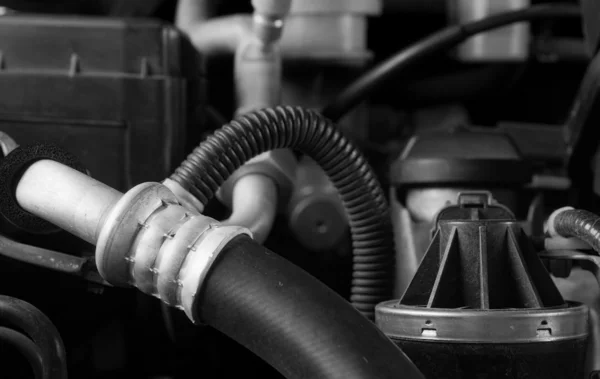
Introduction
When it comes to car maintenance, choosing the best fuel line is a crucial step to make your vehicle run better. Choosing the right fuel line helps your vehicle run smoothly and safely, giving you confidence while driving.
Understanding the Role of Automotive Fuel Lines
Fuel lines carry fuel from the tank to the engine. They ensure a safe and steady flow of fuel, which is important for your vehicle’s performance. Here’s why picking the right fuel line matters:
- Efficiency: A good fuel line helps deliver fuel better, which improves engine performance and saves fuel.
- Safety: Good fuel lines stop leaks and lower fire risks.
- Longevity: Choosing the appropriate material for your car fuel line can extend the lifespan of your vehicle’s fuel system.
Using premium fuel lines can significantly enhance your vehicle’s efficiency and safety. For more insights on the benefits of premium fuel lines, you can refer to this external resource.
Understanding the role and importance of fuel lines helps in making informed decisions about the type of fuel line that best suits your vehicle’s needs. In the following sections, we will delve deeper into the various types of car fuel lines and their respective pros and cons, helping you make the best choice for your vehicle.
Types of Car Fuel Lines
Picking the right fuel line is key to improving your car’s performance. There are different types of fuel lines, each with its own features and uses. Knowing about them can help you choose wisely.
- Nylon Fuel Lines: Nylon fuel lines are flexible and light, often used in modern cars. They’re affordable and easy to install, making them popular.
- Braided Fuel Lines: These are typically made from a flexible rubber hose encased in a braided steel or nylon sheath. They are highly durable and resistant to high pressure, making them ideal for high-performance vehicles.
- Metal Fuel Lines: Often made from materials like steel or aluminum, metal fuel lines are valued for their ability to withstand high temperatures and long-term durability. They are commonly used in older vehicles or in situations where temperature resistance is crucial.
For those interested in exploring different replacement fuel lines, Modern Day Muffler & Brakes offers a variety of options. You can learn more about the best type of replacement fuel lines on their website.
Nylon, Braided, and Metal Fuel Lines: Pros and Cons
Each type of fuel line has its own advantages and potential drawbacks. Here’s a closer look at the pros and cons of nylon, braided, and metal fuel lines:
Nylon Fuel Line
- Pros:
- Highly flexible and easy to install.
- Cost-effective, making it a budget-friendly option.
- Cons:
- May not be suitable for high-pressure applications.
- Less durable compared to metal or braided options.
Braided Fuel Line
- Pros:
- Extremely durable and resistant to high pressure.
- Offers excellent protection against abrasion and heat.
- Cons:
- Can be more expensive than nylon lines.
- Installation can be more complex due to its rigidity.
Metal Fuel Line
- Pros:
- Highly resistant to temperature fluctuations.
- Long-lasting and durable, especially in harsh conditions.
- Cons:
- Can be prone to corrosion if not properly maintained.
- Less flexible, making installation more challenging.
For a more in-depth comparison, you can explore the discussion on LS1 Tech.
Choosing the Best Fuel Line Material
Selecting the right fuel line material is crucial for your vehicle’s performance and safety. Different materials offer various benefits and drawbacks, so it’s important to consider several factors when making your decision:
- Climate: Consider the temperature extremes in your area. Metal fuel lines, for example, are great for high-temperature environments due to their resistance to heat.
- Vehicle Type: The type of vehicle you own can influence your choice. High-performance cars might benefit from braided fuel lines, which offer excellent pressure resistance.
- Performance Goals: If you’re looking to enhance your vehicle’s efficiency or power, the material of the fuel line can play a significant role. Nylon fuel lines are flexible and cost-effective, making them a good choice for general use.
- Budget: Consider the cost of the material and installation. While braided lines are durable, they can be more expensive and complex to install.
By evaluating these factors, you can choose the best fuel line material that aligns with your vehicle’s needs and your personal preferences.
How to Install Fuel Lines
Installing fuel lines may seem daunting, but with the right guidance, it can be manageable. Here’s a brief overview of the process:
- Gather Tools and Materials: Ensure you have all necessary tools and the correct type of fuel line for your vehicle.
- Safety First: Work in a well-ventilated area and wear protective gear to avoid exposure to fuel fumes.
- Remove Old Fuel Lines: Carefully disconnect and remove the existing fuel lines, taking note of their routing.
- Install New Fuel Lines: Follow the same routing as the old lines, ensuring secure connections to prevent leaks.
- Test for Leaks: Once installed, check for any leaks by running the engine and inspecting the connections.
For a more detailed guide, you can watch this video tutorial on how to install fuel lines. Remember, if you’re unsure about any step, it’s always best to consult a professional.
Next Steps for Enhanced Vehicle Performance
In conclusion, understanding the role of automotive fuel lines and selecting the right type can significantly enhance your vehicle’s performance. Here are some steps you can take next:
- Consult a Mechanic: Speak with a professional to get personalized advice on the best fuel line material for your vehicle.
- Explore Options: Look into different car fuel lines such as nylon, braided, and metal to find the best fit for your needs.
- Stay Informed: Continue researching and learning about fuel lines to make informed decisions that maintain your vehicle’s efficiency and safety.
By taking these steps, you ensure that your vehicle performs optimally, providing you with peace of mind and a smoother driving experience. Remember, informed decisions lead to better vehicle maintenance and longevity.
Write and Win: Participate in Creative writing Contest & International Essay Contest and win fabulous prizes.


